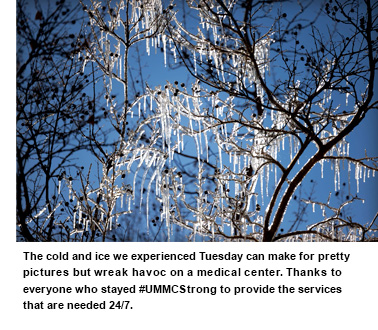The Spirit Doctor Effect
Good morning.
I was thinking about how I started this new year in VC Notes, sharing positive news that was made possible by the effort and thoughtfulness of many members of our clinical teams. I think it’s so important that we keep up a high level of compassion in caring for our patients and visitors. This improves patient satisfaction and, I’m sure, leads to more effective and better outcomes.
 But this way of thinking isn’t only for people in direct patient care roles. Regardless of your position, you can and will have the opportunity to play a part in the experience of our patients and help their families and loved ones feel they are in good hands here.
But this way of thinking isn’t only for people in direct patient care roles. Regardless of your position, you can and will have the opportunity to play a part in the experience of our patients and help their families and loved ones feel they are in good hands here.
I feel strongly about this and shared similar thoughts in the April 8, 2016 VC Notes titled, “Be a Spirit Doctor.” And I think the message I shared then fits well with what I’m hoping to convey today.
“Spirit doctors” is a phrase coined by author Dan Shapiro, PhD, in his book, “Mom’s Marijuana,” to refer to people with whom he had brief encounters while he was going through his own cancer journey. It was those encounters that lifted him up and improved his day – without them knowing his diagnosis or struggles. The book is worth a read. I first met Dr. Shapiro about 20 years ago and have followed his career since then. He has visited our campus several times over the last two decades with the most recent visit being this week. Just yesterday, he spoke to a group of Medical Center leaders on the topic of managing burnout.
In the stories he shares about his personal cancer journey as a teen and young adult, it is notable that those he refers to as spirit doctors actually were not a part of his care team. But what they provided played a part in helping him through his treatments. He notes that, at a point when his cancer was not responding to therapy, he found encouragement from the people he interacted with who were not a part of his care team and, therefore, didn’t know what his diagnosis or prognosis was. He called these people the spirit doctors.
One of his spirit doctors was a service technician whom he described as “standing awkward at the end of my bed” with tools on his belt to service the patient room. Shapiro wrote, “You told me three times you were there to check the thermometer ‘cause I’d complained, and you knew how tough it was to be cold when you’re feeling sick. You apologized for the intrusion.”
A telephone operator served as another spirit doctor when Shapiro was trying to reach the pharmacy. He shared about a woman with an “old voice,” writing: “You figured out who I might need to call. Didn’t just give me the number but ran interference for me. Called and made sure they were there. You saved me a trip on a feverish day.”
About the girl “with thin elbows” who brought Shapiro his tray of food he most certainly didn’t feel like eating, he recalled, “You shake your head at me and tell me I need to eat if I’m going to get strong … . You make me smile.”
These types of simple, brief encounters can be a difference maker for a patient or family member who is having a hard day. Even without any medical training, we can all play a role in how someone perceives their treatment or prognosis. Shapiro ends the chapter about spirit doctors saying, “I’m already gone. It’s already over. Why not stop fighting? And then one of you enters my room and laughs with me, or flirts, or tells me about a good movie. And I’m back. I’m still alive. And I’m gonna kick this thing.”
As I noted before, whether you spent years training to be a caregiver or even if you are not involved in direct patient care, remember that ALL of us are a part of the patient care team in some respect. You never know when a nod, a smile, a kind word or simply a warm offer to help someone navigate our campus is the vehicle of hope for a patient or the family member of a patient. Every day you have the opportunity to offer our patients, families, visitors or coworkers the warmth of a caring spirit. Every day, we can all be a spirit doctor for someone. I hope you will take advantage of it.
Being kind to each other, respectful of our common humanity, is part of who we are, and what compels us to strive for A Healthier Mississippi.



